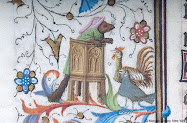 I’m back from holiday and for my sins, this week I’m puppy-sitting while the pup’s owners head off on their holiday. This morning, I took the beastie for one of our favourite walks around the neighbourhood, taking in the local war memorial. The memorial sits on top of a hill, tucked into a little patch of grass and bush off the road. It has a great view over the harbour and city, so I usually stop there for a few minutes and enjoy the scenery while the pup has a bit of a run in the grass.
I’m back from holiday and for my sins, this week I’m puppy-sitting while the pup’s owners head off on their holiday. This morning, I took the beastie for one of our favourite walks around the neighbourhood, taking in the local war memorial. The memorial sits on top of a hill, tucked into a little patch of grass and bush off the road. It has a great view over the harbour and city, so I usually stop there for a few minutes and enjoy the scenery while the pup has a bit of a run in the grass.Pretty much every town in New Zealand has one of these 1914 – 1918 memorials. In the smaller provincial towns, it’s sobering to see how many of the soldiers listed have the same surnames and to reflect on the impact their loss must have had on their families and communities. My local memorial is no different, and the list of the dead usually elicits in me a certain wistfulness. But today, for some reason, I was struck instead by the standard war memorial admonition, ‘Lest we forget’.
Lest we forget? I think it may be more apt to say ‘Lest we remember’. While the memorials keep us focused on a romanticised image of the flower of the country’s youth falling heroically in some foreign field, we can avoid remembering the greed, egotism, racism and vicious nationalism (on all sides) that fuels most wars. And we can avoid remembering darker legacies, like domestic internment or the systematic rape and other crimes perpetrated against civilian populations as part of the ‘collateral damage’ of victory.
Then there are the smaller domestic tragedies. The children fathered by servicemen on leave who were left unacknowledged and unsupported, and were sometimes shunned by their communities for their illegitimacy. The children who were sent away from their homes in places like Belfast and London to protect them from the bombing, but who ended up in rural foster homes where they were neglected, abused, and worked like slave labour. Or even the simple, gnawing want created by a war machine that sucked up almost all available resources and made rationing a way of life, not just during the conflict but for years after it.
It was only after I finished writing this post that I realised what day it is today. I expect that the news and documentary channels will be running their usual mix of commemorative programmes and exposés of terrorism. We’ll be asked not to forget the civilian lives lost on September 11, and the US and British soldiers who’ve died since in this futile ‘war on terror’.
But I don’t expect we’ll be called upon to remember the dead and maimed amongst the Iraqi civilian population (including those raped and/or murdered by their ‘liberators’), or to remember the many private interests who have profited from this latest war to the tune of billions. And I don't expect we'll be asked to remember, or even think about, how our own fear of a Muslim 'other' who is not and can never be 'like us' prevents us from searching for any solution that doesn't involve either conquest or assimilation.




2 comments:
Or bombing.
Lovely post. Thank you.
Post a Comment